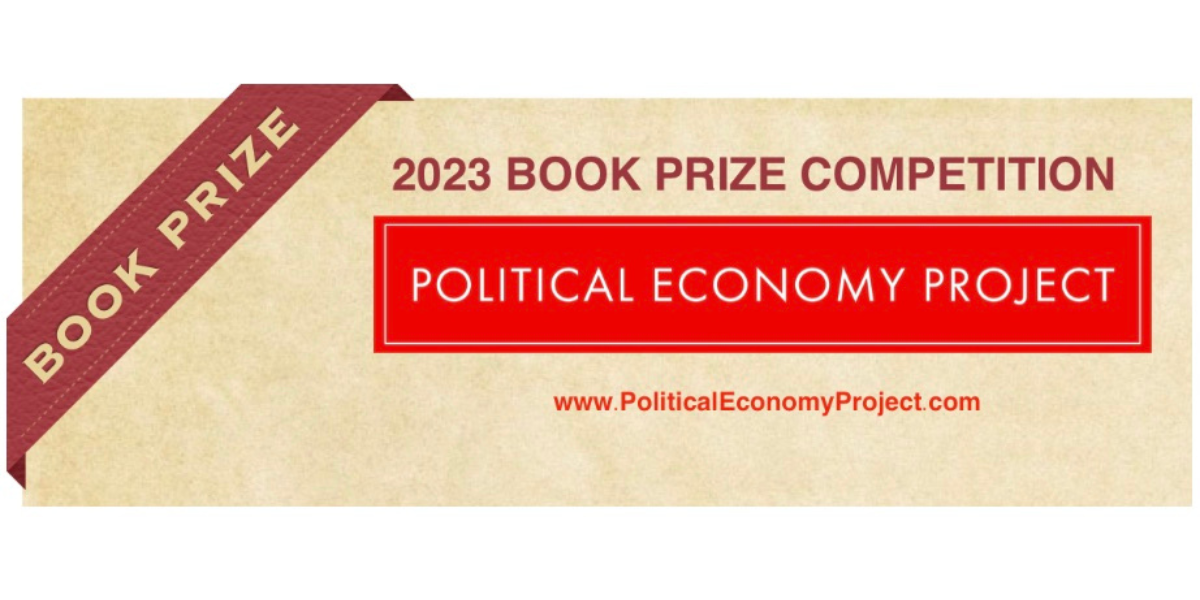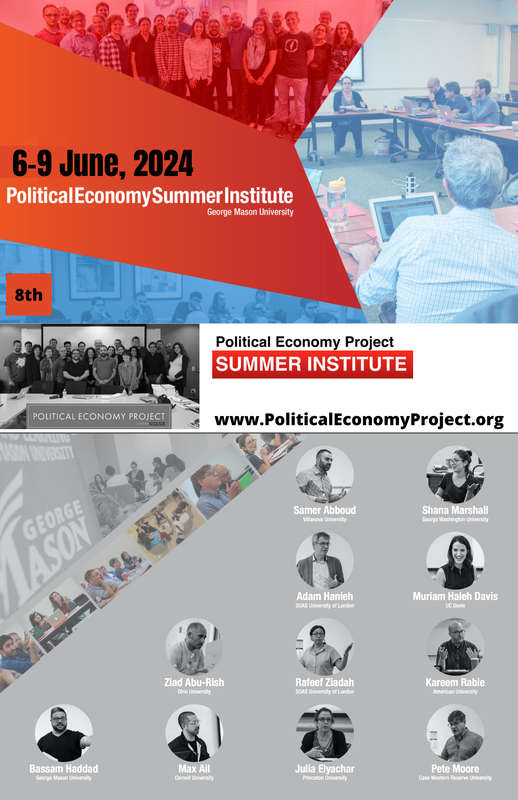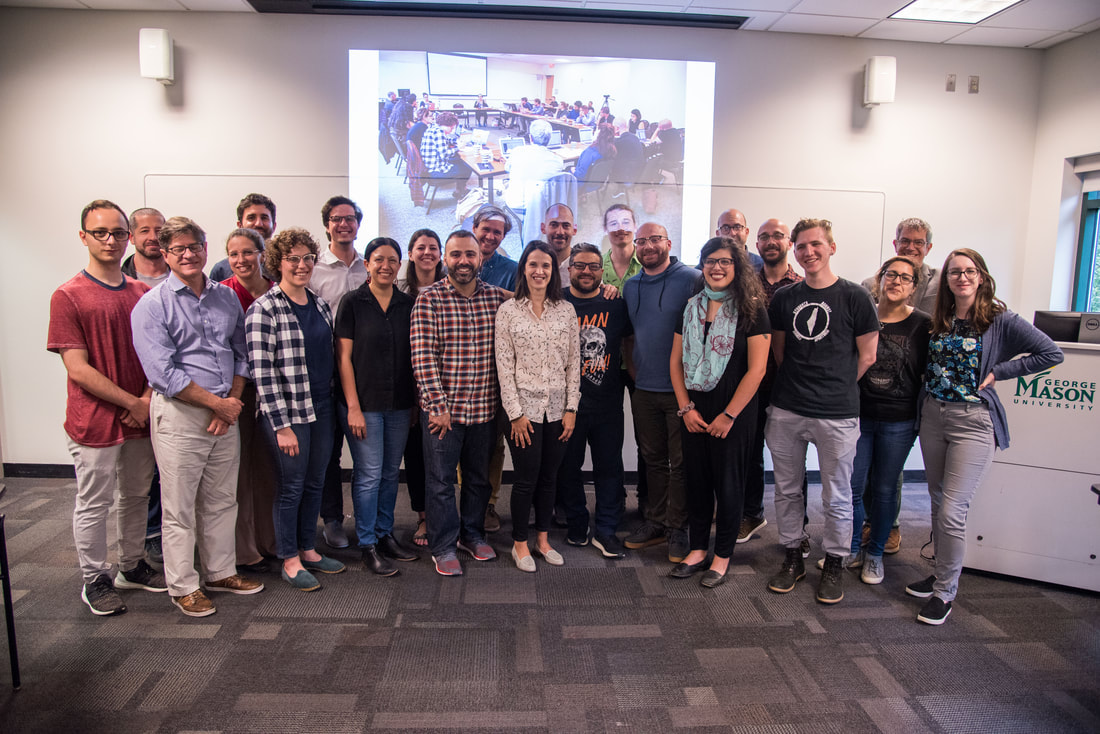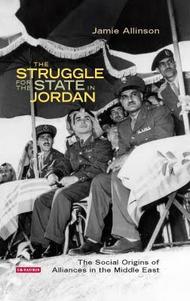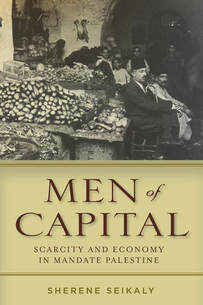|
The Political Economy Project (PEP) is the culmination of several years' worth of networking and planning by the Arab Studies Institute and its affiliate scholars. The project aims to develop and encourage critical approaches to political economy, interrogate the dominant paradigms, and provide insights for alternatives. By its nature this project is simultaneously intellectual and political, as these realms are inseparable. Therefore, we do not limit our ambitions to producing books and articles. We plan to weave networks of individuals, influence pedagogical approaches, and for those interested, advocate for organic alternatives to existing dominant notions of “development,” growth, redistribution, power relations, and social justice. Finally, we are committed to expanding the scope of this project beyond the “Middle East” for comparative as well as intellectual/political purposes. Read more about PEP HERE and learn more about our network HERE. |
|
Happening at The Political Economy Project
Coming Soon | Call for Submissions
2024 Middle East Political Economy Book Prize
|
The Political Economy Project (PEP) is pleased to invite nominations for our 2024 Middle East Political Economy Book Prize. PEP aims to recognize and disseminate exceptional critical work on the political economy of the Middle East. While the book must have a political economy theme, we welcome nominations from across academic disciplines. Submissions will be read and judged by a committee drawn from PEP’s membership. Eligible texts must have been published in 2023 and can be either Arabic or English language. The book must make an original contribution to critical political economy research. The author(s) of the winning book will receive a prize of US$1000 and will be invited to give a talk at a PEP affiliated University. The author(s) will also be interviewed by the Arab Studies Institute’s Audio Magazine, Status/الوضع
|
If you intend to participate, please fill out the submission form here. Submit any questions to:
bookprize@politicaleconomyproject.org
bookprize@politicaleconomyproject.org
Call for Proposals: Political Economy Summer Institute 2024
|
The Political Economy Summer Institute is soliciting applications from doctoral students and other researchers for our eighth Political Economy Summer Institute to be held online on 6-9 June 2024. The aim of the Political Economy Summer Institute (PESI) is both to provide graduate level engagement and instruction as well as to connect doctoral students and independent researchers with mid-career and senior scholars working in the field of critical political economy. The Summer Institute consists of three main parts: (1) doctoral students presenting their research and receiving written and verbal feedback from the participants, (2) methodological and theoretical workshop sessions led by faculty scholars, and (3) small break-out group discussions that build on the faculty-led sessions.
Anyone interested in submitting an application to attend the workshop should provide the following: [If you are not a Ph.D. student, you may still apply.]
http://www.politicaleconomyproject.org/pesi-application.html The Pedagogy Working Group will review the applications and may request further information from potential participants. All applicants will receive notification about their applications by early May. |
2019 Middle East Political Economy Book Prize Winner
&
Honorable Mention
&
Honorable Mention
The Political Economy Project (PEP) is pleased to announce the results of the 2019 Middle East Political Economy Book Prize competition. With this prize, PEP aims to recognize and disseminate exceptional critical work on the political economy of the Middle East. This year marks the fourth annual award, and the selection committee reviewed nearly twenty nominations for a range of books dealing with political economy—representing a diversity of disciplines, topics, and geographic focus. The selection committee was particular impressed with two books in particular and consequently felt the need to recognize an honorable mention award.
The 2019 selection committee recognizes the following authors for their original contributions to critical political economy research:
The 2019 selection committee recognizes the following authors for their original contributions to critical political economy research:
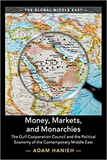
Winner
Adam Hanieh’s Money, Markets, and Monarchies: The Gulf Cooperation Council and the Political Economy of the Contemporary Middle East
(Cambridge University Press, 2018)
Adam Hanieh’s Money, Markets, and Monarchies: The Gulf Cooperation Council and the Political Economy of the Contemporary Middle East
(Cambridge University Press, 2018)
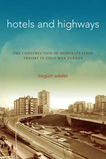
Honorable Mention
Begüm Adalet’s Hotels and Highways: The Construction of Modernization Theory in Cold War Turkey
(Stanford University Press, 2018
Begüm Adalet’s Hotels and Highways: The Construction of Modernization Theory in Cold War Turkey
(Stanford University Press, 2018
Political Economy Summer Institute (PESI) 2019
Thank you to all of the faculty and fellows who made our third annual Political Economy Summer Institute a tremendous success.
|
Over the course of four days, June 7th to June 10th 2019, and in conjunction with the Arab Studies Institute, the Political Economy Project held its 4th annual Political Economy Summer Institute (PESI) at George Mason University. The Summer Institute brought together a diverse collection of scholars and graduate student fellows from around the world for a series of workshops on the foundational concerns of critical political economy, with special attention devoted to conducting research in the contemporary Middle East.
The Institute served not only as an overview of critical debates and fundamental concepts for student participants, but also as an opportunity for faculty participants to reflect on long-running debates and acquaint themselves with emerging research agendas. Read more about the Political Economy Summer Institute here. |
|
|
Political Economy Summer Institute (PESI) video from our first meeting
|
2017 Middle East Political Economy Book Prize Winners
|
The Political Economy Project (PEP) is pleased to announce the winners of the 2017 Middle East Political Economy Book Prize. With this prize, PEP aims to recognize and disseminate exceptional critical work on the political economy of the Middle East. For its inaugural award, the selection committee welcomed nominations for books on political economy published between 2014-2016 from a range of publishers and across academic disciplines. After reviewing a dozen submissions, the 2017 selection committee recognizes two co-winners for their original contributions to critical political economy research:
|
Hanan Hammad’s Industrial Sexuality: Gender, Urbanization, and Social Transformation in Egypt (University of Texas Press)
& Johan Mathew’s Margins of the Market: Trafficking and Capitalism across the Arabian Sea (University of California Press) |
Spotlight: 2016 Middle East Political Economy Book Prize
The Political Economy Project is pleased to announce the winners of the 2016 Middle East Political Economy Book Prize
|
Spotlight: What is Political Economy?
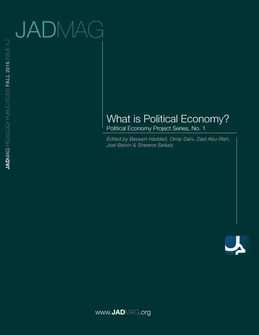
JADMAG: What is Political Economy?
Edited by Bassam Haddad, Omar Dahi, Ziad Abu-Rish, Joel Beinin & Sherene Seikaly This issue of JadMag--What is Political Economy?--is the first of a series on the Political Economy of the Middle East. Drawn from lectures presented at the Political Economy Project’s founding workshop, the authors in this issue seek to define and interrogate the field of political economy and address how they actually “do” political economy. While authors agree on the interdisciplinary study of political economy as well as the basic tenets of the Marxist tradition, they nevertheless present various perspectives. Visit Tadween Publishing to purchase this JadMag! |
click above to visit our PEPBLOG for the latest updates on Political Economy Project members and events
|

